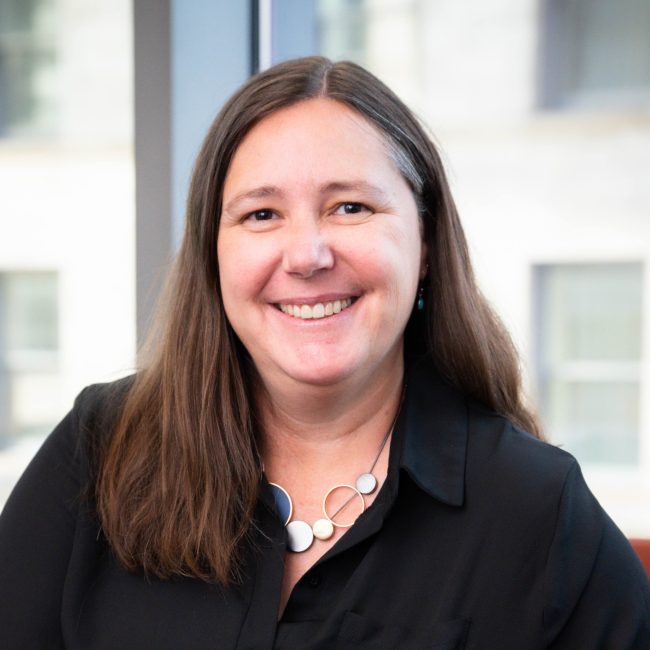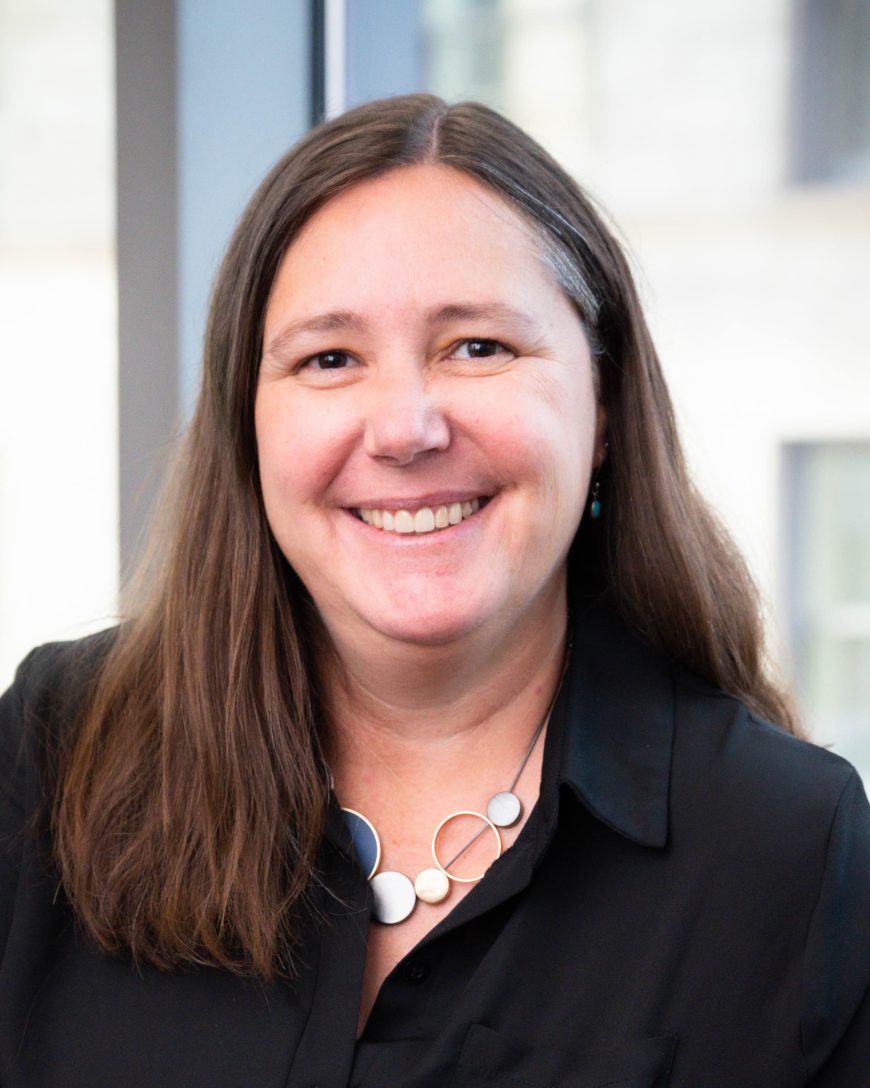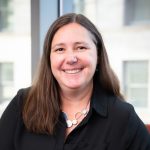Curated conversations with data and AI for social impact leaders on their career journeys
Pathways to Impact is a series of conversations with data for social impact leaders exploring their career journeys. Perry Hewitt, CMPO of data.org, spoke with Tracy Teal, Open Source Program Director at Posit PBC, about how her combined experience in community engagement, open source, and tools informed her career path.
Would you please share a little about what role or sector you came from before moving to data for social impact? Please give us a sense of your career trajectory to date.
One of the compelling things about this new data for social impact space is that career paths are not straight, and mine is no exception. In college, I really liked math and biology, and essentially, I couldn’t decide. So, I found a major where I could do both.
I had a roommate who worked at a computer lab, and I didn’t know anything about computers. I offered to volunteer in the lab, which then turned into a job helping to administer the computers in the biology computer lab. This progressed through grad school where I studied both microbiology and metagenomics. Computers were vital in the early days of us getting back a lot of genomic data and using that data to analyze microbiology and microbiological communities.
By the time I was in my postdoc, it became clear that the ability to work with data was an important asset in the field of biology. As a result, some people who had data and open-source software skills ended up collaborating with those who could not — and that system did not scale. People without data skills were disempowered in their ability to conduct their own research. For example, they would send out samples for sequencing, and then not know what to do with the data they got back. Similarly — the people analyzing the data — like me! — did not always possess the subject matter expertise to direct the research questions or conduct the right analyses. The answer was clear: We needed people with that biological insight to become more data-capable.
I became interested in how we could train people to be able to analyze their own data. A good analogy is a car: I don’t know how to fix my car. When I take it to the automatic mechanic, I just trust it works out. And it’s never a good feeling. You’re thinking, “What’d they do? Is it fine? Is that the right amount of money?” You don’t want biologists feeling like that about their own research. You want to empower them to own the car and be the auto mechanic.
At the time, I worked with an organization called Software Carpentry which was teaching researchers how to write better code. A few colleagues and I began to envision a similar Data Carpentry, helping people learn how to analyze their data through a domain-specific lens. We realized that people were entering the data space via their own disciplines — as biologists, economists, or historians — not through some abstract interest in data and data science.
We co-founded Data Carpentry and then were awarded a grant from the Gordon and Betty Moore Foundation that let us turn it into an organization. I became the executive director of that nonprofit, and our team, together with Software Carpentry, developed workshops and instructors, and soon were training thousands of people all over the world. In terms of my personal trajectory, it felt fast to go from data training as an important part of what I do to being everything that I do!
Eventually, we merged with Software Carpentry to become The Carpentries where I served as executive director for five years. As I said earlier, these career paths are not straight — for me, it was a big shift from researcher/educator to running an organization, which requires a different skill set. That’s one career transition I’m still pretty passionate about trying to support people through. I always say that I tried to get my MBA via Google. My thought process was: “We need to do this thing. I don’t know how to do that thing. But other people have done that thing. Let me Google it and find the templates?” And as I learned from my time in the nonprofit space and the open-source community, there are different considerations.
Today, I’m at Posit PBC (formerly R Studio) as the open-source program director. My current role combines aspects of my experience in community engagement, open source, and tools. I spend a lot of time thinking about how best to support the Posit team here that works in open source and also thinking about how that team supports the broader R community and open source users.
Part of the Pathways to Impact series
What part of data for social impact does Posit (formerly RStudio) solve? What are you trying to do?
Posit is a B corporation, with a mission of creating free and open-source software for data science, scientific research, and technical communication. We’re focused not only on creating the software but also on empowering users to be able to use that software.
We create R packages: something like 30 of the top 50 most downloaded R packages on CRAN are ones that are developed and maintained at Posit. And to empower the users we invest in education and outreach, including good documentation on how to use these tools. We make an effort to understand how people use the tools in order to continue to adapt them for real use cases.
Ultimately, we want to ensure that more people are able to use data science to answer the questions that are important to them.
In one sense, your career journey sounds like smooth sailing. You went from college to grad school, and then, you’re an executive director. Were there any blockers along the way?
That’s a great question because the narrative does make it sound smooth, but that was definitely not the case! Let me just speak to that one transition from postdoc to executive director. As a postdoc in an academic environment, the only example of success is a professor. Even when you know there are other options, that model of success is still so deeply ingrained in you! Part of the decision around that transition was that I was an assistant professor, but not on a tenure track. My partner was at the same institution in a tenure-track position. And I didn’t want to be a non-tenure track professor forever, where getting funding and building a lab would be challenging. I knew it wasn’t what I wanted to do forever.
At the time I was considering my next steps, this grant from the Gordon and Betty Moore Foundation came through, and I made the leap. While I was passionate about the work, I was also pretty devastated to be leaving an academic path. That’s something I say about career transitions: while you can be truly excited about the path you’ve chosen, there’s an element of mourning a career and a life you thought you would have. In an academic context, your life is so tied up with your work, that it’s not just changing jobs: it’s really forming a whole new idea about who you are.
I was lucky that the challenges presented by running an organization were exciting to me in similar ways that research challenges were exciting to me. While that may not be true for everybody, I was lucky that it worked out for me.
That's something I say about career transitions: while you can be truly excited about the path you’ve chosen, there’s an element of mourning a career and a life you thought you would have. In an academic context, your life is so tied up with your work, that it's not just changing jobs: it's really forming a whole new idea about who you are.
Tracy Teal, Ph.D. Open Source Program Director Posit PBC
You’ve mentioned discipline-specific social impact is possible when you enable more people to use data effectively. Any other outcomes you have observed?
How we saw it back at Data Carpentry, and how I still see it in my role now, is that with data science, we were and still are in danger of only certain types of people being able to analyze data. So, that means we’re only going to ask certain questions. We’re going to have certain biases when we analyze that data. We need to have more people who are capable and feel like they are capable of analyzing data or we are going to get a very biased perspective of the world when we’re taking data-driven approaches to decision-making. There’s still a really big danger of that; there’s just a certain set of people from primarily privileged backgrounds who have these skills, and they’re analyzing all our data. And where that gets us is not a good place — I think we’ve all seen the results of those biases playing out in code.
Which community of people or resources bolsters your work? If you’re looking for advice on how to lead a program or how to solve a thorny problem, whether that’s a technical problem or a messy human problem, where do you go?
There are definitely communities of people who bolster our work. Carpentries or Posit PBC have the privilege of working with user communities who are really passionate about their work, and essentially volunteer their time to make cool apps, write documentation, or teach workshops. There are huge communities of people supporting our shared mission.
I have not really found a formal network. I do have an invaluable network of people I’ve met along the way. These tend to be people who have been in the trenches of leading communities and leading products because there’s so much you really can learn only by doing.
Here’s an example: my friend Lou Woodley, who runs the Center for Scientific Collaboration and Community Engagement (CSCCE). She is definitely a really important part of the set of people that I talk to about some of these challenges. Also, her organization has created a community of community managers. With community management being a part of my role, CSCCE has been really important both as a place I connect with people and a place to find great resources about community management. That’s definitely one of my go-to’s.
I also rely on the Software Sustainability Institute, which brings together a global network of instructors, and provides a space for us all to talk about how to teach these skills.
If you are an amazing data scientist somewhere, that's awesome. But then, when you go to the city government, they're the experts. While you bring a certain set of expertise, they're the experts on their community and what questions they have.
Tracy Teal, Ph.D. Open Source Program Director Posit PBC
What non-data science skill set has offered the greatest return on your work?
I think of two things. One is comfort with uncertainty. I don’t know if that’s a skill, but it has seemed to be important.
And the other I would say actually is facilitation. I think that goes with empathy a little bit, but it’s being able to be in a room, help create a space where people can have conversations, listen to that conversation, and be able to synthesize and help figure out the next steps. Without the facilitation piece, you don’t have the power of the group, which is really what’s going to advance things forward. This not only draws out better ideas but also ensures all the people in that room are invested in the outcome.
It’s definitely something I’ve taken courses on and done a lot of reading on to try to be a better facilitator. I still have a long way to go.
What advice do you have for someone new to the field who’s interested in doing this work?
I read a Science or Nature article about alternative career paths for academics. And there was something in there that reminded me that there are many ways to contribute to science. We have this idea that the only way to contribute to science is to be a researcher, and that’s not true at all. If you want to contribute to climate or to health, you don’t need to leave your strengths or your skills behind to achieve that. It’s more about aligning your skills and your interest with that topic and finding the ways that you uniquely can contribute in a way that feels authentic to you.
It could be leading a citizen science project where you’re helping high school kids collect data. It could be teaching others how to analyze data, or interpret a graph. There’s more to do than sit at the computer analyzing the data. If you are in finance and you know how to manage a budget, volunteer on the board of a data organization that you care about. Many nonprofits need those kinds of skills on their boards, and you get to be connected to that mission. There are many different ways to be in this community and contribute what you bring without wholesale retraining.
Finally, I would add that humility is important. If you are an amazing data scientist somewhere, that’s awesome. But then, when you go to the city government, they’re the experts. While you bring a certain set of expertise, they’re the experts on their community and what questions they have. To be successful in entering this space, set aside the view that “I will solve these people’s problems for them.” Remember: you’re all the heroes tackling these challenges. There’s not one hero in that scenario.
What do you see as an emerging trend or growing behavior in data for social impact over, say, the next three to five years?
I would say machine learning. That’s definitely already on the rise and will continue to be a driving force in data for social impact. You have more applications, more thoughtful applications of machine learning in social impact spaces.
What’s your don’t miss daily or weekly read? It could be related to data science or education for data social impact, or it could just be a guilty pleasure. What keeps you informed and sane in a busy world?
My local newspaper. It does really help me just know what’s going on in my city, to hear about things that I don’t do. I think otherwise, I do rely on Twitter and Mastodon to surface articles of interest. I also listen to podcasts, often management leadership podcasts rather than data podcasts.
I do read a lot of books on leadership, but especially on inclusive leadership. There’s a lot to learn about access and minoritized groups in data. And I loved Dr. Brandeis Marshall’s book, Data Conscience. She’s one of a few people whom I think, “Everything they write, I read.”
About the Author
Perry Hewitt is the Chief Marketing and Product Officer of data.org where she oversees the marketing and communications functions, as well as digital product development.
Read moreSeries
Pathways to Impact
This data.org series interviews leaders in Data Science for Social Impact with a lens of how they got there, as well as the skills and experiences that have fueled their career progression.
data.org In Your Inbox
Do you like this post?
Sign up for our newsletter and we’ll send you more content like this every month.
By submitting your information and clicking “Submit”, you agree to the data.org Privacy Policy and Terms and Conditions, and to receive email communications from data.org.


